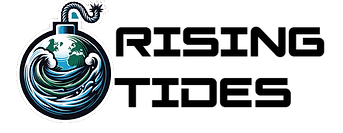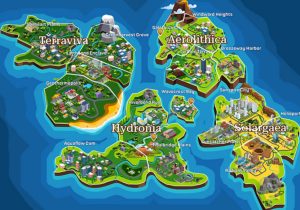Gameplay
In Rising Tides, each player represents one of five institutions with a unique role in fighting climate change. Each institution has special abilities and a goal to reduce CO2 emissions while competing for influence. Each player starts with a deck of resource cards that allow them to build both non-green and green structures. The game world is divided into four countries, each containing four cities. Players build their structures in these cities to promote green living and reduce emissions. Institution cards offer special actions based on the player’s role. These cards can drastically alter the game’s progress and players’ strategies. The Modifier Bar shows the immediate impact of your actions on the environment. Building structures increases the modifier,
while greening them reduces it. The Emission Bar shows the overall impact of your actions on the environment. It starts at 100. The goal is to reduce this to 0 by making good decisions. The points on the modifier bar are added to the emissions following the completion of a round. Both bars are critical for tracking progress towards winning the game and avoiding environmental disaster.
Logic of the game:
The game progresses through rounds where players draw resource cards, build structures, and play institution cards to advance their objectives while collaborating to reduce the emissions bar to zero. Players face both minor and major environmental disasters triggered by reaching specific thresholds on the emissions bar, which can set back progress and require strategic responses.
- Players are assigned their roles, draw their initial resource cards, and place their starting structures on the map.
- Players can build structures, use institution cards, or activate special abilities defined by their roles. Strategic decisions must balance the immediate benefits of construction and expansion against the long-term goal of environmental sustainability.
- Triggered by specific levels on the emissions bar, disasters require players to adapt their strategies and sometimes work more closely together to mitigate impacts and continue towards their goals.
- The game is won by successfully reducing the emissions bar to zero, requiring cooperative efforts to build green infrastructure and implement sustainable practices across the map, while also navigating the competitive elements of the game.
Context
Rising Tides is set against the global climate crisis, embodying the “tragedy of the commons,” where individual actions impact collective resources. The game highlights the balance between development and sustainability through strategic decisions and the impact on environmental metrics. Players learn the urgency of mitigating climate change and the importance of cooperative efforts.
Target group
Benefits
Players will learn the importance of balancing development with sustainability, the impact of individual and collective actions on the environment, and strategies for reducing CO2 emissions. They will also understand the urgency of climate action, the roles of different institutions in combating climate change, and the need for cooperation to prevent environmental disasters.
Trivia
The game started as a physical board game in 2022. The game was later created as an online game over the course of a year and was completed in 2024.
Created by
Genre
Number of players
Number of moderators
Duration
Languages
Technical requirements
iPad, Laptop, or Desktop



